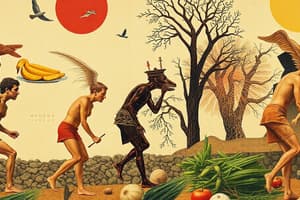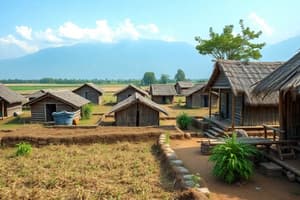Podcast
Questions and Answers
Which animal is described as aggressive towards livestock?
Which animal is described as aggressive towards livestock?
- Zebra
- Hippopotamus
- Giraffe
- Rhinoceros (correct)
What animal in the Americas can be useful for draft work?
What animal in the Americas can be useful for draft work?
- Water buffalo
- Llama (correct)
- Horse
- Elephant
What is one reason mentioned in the text for why agriculture might have emerged?
What is one reason mentioned in the text for why agriculture might have emerged?
- To increase alcohol consumption
- To elevate leisure time for humans (correct)
- To domesticate mythical creatures
- To produce more meat
Which animal mentioned in the text does not provide much meat despite its size?
Which animal mentioned in the text does not provide much meat despite its size?
What does Charles Darwin believe about agriculture according to the text?
What does Charles Darwin believe about agriculture according to the text?
What was Charles Darwin's view on cultivated land according to the text?
What was Charles Darwin's view on cultivated land according to the text?
Flashcards are hidden until you start studying
Study Notes
- John Green welcomes students to Crash Course World History series
- Human evolution from hunting and gathering to creating things like hamburgers and internet
- Early humans relied on fishing, which caused them to live near water
- Archaeological records and knowledge of ancient civilizations help us understand the past
- 15,000 years ago, humans were hunter-gatherers who hunted, gathered, and farmed
- Agriculture provided surplus food, enabling the building of cities and specialization of labor
- Before agriculture, gathering food required 1,000 calories of energy, while producing 1,000 calories required 1,000 calories
- Agriculture allowed surplus food production and enabled the population to grow
- Agriculture also led to the decline of music and sex, as people worked longer hours
- Agriculture began in various parts of the world, including Egypt, China, and the Americas
- People began to farm crops that grew naturally in those areas, such as rice in Asia and corn in the Americas
- Agriculture led to the decline of hunting and gathering, but also brought new challenges, such as the need to change the climate to support farming
- Agriculture required the domestication of animals for labor and milk production
- Cattle provided require meat and leather, but also required transportation for food and water
- Green discusses the benefits and drawbacks of agriculture, such as the ability to produce more food and the need to change the climate to support farming.- The reason why livestock farming is limited to certain areas of the world is that there are not many animals suitable for draft work.
- For example, horses, elephants, water buffalo, zebras, camels, giraffes, hippos, rhinoceroses, and porpoises all share the commonality that they were not originally found in the Americas.
- The only animal in the Americas that can be useful for draft work is the llama.
- However, most animals do not serve agriculture well, such as the river horse, which is large but does not provide much meat, or the horned rhinoceros, which is aggressive towards livestock.
- Mythical creatures also exist but they require a lot of time for breeding.
- This brings me to the open letter. I'm not sure what's in the secret box, but it's made of a rough material.
- Welcome, mythical creatures! You're beautiful, intelligent, and magnificent. Why does your labor last for 22 months? This is crazy! And then, you give birth to a small one, just one. If I were like the animals, I could have controlled things between us right now. But the best developmental feature is that you are useful to humans.
- Here's a diagram of the number of animals and mythical creatures in the world.
- If I had controlled myself like animals in controlling things between us, I wouldn't have been able to form secret societies that plot against humans! But then, I could have formed a magnificent civilization with cars and airplanes. What a pity that I have to carry the load for 22 months, then give birth to a small one. This is very frustrating!
- Despite all the nice offerings, I'm John Green. Let's go back to the Agricultural Revolution and why it happened.
- Historians aren't certain about what exactly caused the Agricultural Revolution, but they do agree that it probably wasn't a single event.
- It's possible that the need for more labor caused the shift towards agriculture as it required more work. Or that the surplus provided humans with the necessary leisure time to experiment with agriculture. Or that agriculture emerged as a means of producing more grain for alcohol.
- According to most historians of the late eighth to the tenth centuries, Charles Darwin believed that agriculture was a fluke. He said: "The varied vegetation and good cultivated land are anomalous exceptions to the natural vegetation of the earth."
- However, in the coming weeks, we'll find out what the word "hemj" means. It's commonly used to mean "it's not me."
- A better theory might be that there was no Agricultural Revolution, but agriculture evolved from a human desire for more food.
- The first farmers knew that grains grew best when they were sown near them, and when they found something that produced food, they wanted more of it. However, if that food was limited, they would want less of it. I want to eat it all. It's much better. Some early farmers discovered easier varieties of wheat, which they could plant, grow, and harvest. They didn't do this to launch a revolution, but to get more food.
- It's been more than 13,000 years since humans in southern Greece were farming wheat. In a Frankenstein's Tomb, there's a huge pile of wheat chaff, most of which is larger than modern wheat. This indicates that the people who were eating it were doing so not for consumption, but to make it bigger and more nourishing.
- Wheat is a valuable source of cooked food because it contains high heating values and is easy to transport. And because it has unique grains that stick to it, all you have to do is dig holes around it to keep it. This is not a revolution, but a series of human attempts to increase heating values.
- However, it's important to note that agriculture was a failing project, as without it, people would have changed the climate by building dams, cutting forests, and digging for oil to turn it into fertilizer.
- Many people chose agriculture independently, but was it the right choice?
- But beyond that
- History tells us that revolutions are not events, but ongoing processes. For thousands of years, people have made decisions that shaped the world as we know it today, and those decisions cannot be undone. And just like the decisions we make today will be remembered in the future as revolutions. In the coming week, we'll go on a trip to the Valley of the Sun River.
- This earth is very sensitive, just like our earth. We're going to the Valley of the Sun River. Stay with me. This program was produced by Stan Molnar and written by Danica Johnson with the help of a history professor, Raoul Mayer, and the graphic design team, Thought Bubble.
- If you want to read a line from the coming week, you can do so in the comments, and our team of historians will try to answer your question. Thank you for watching, and as they say in my hometown, don't forget to be awesome.
Studying That Suits You
Use AI to generate personalized quizzes and flashcards to suit your learning preferences.




